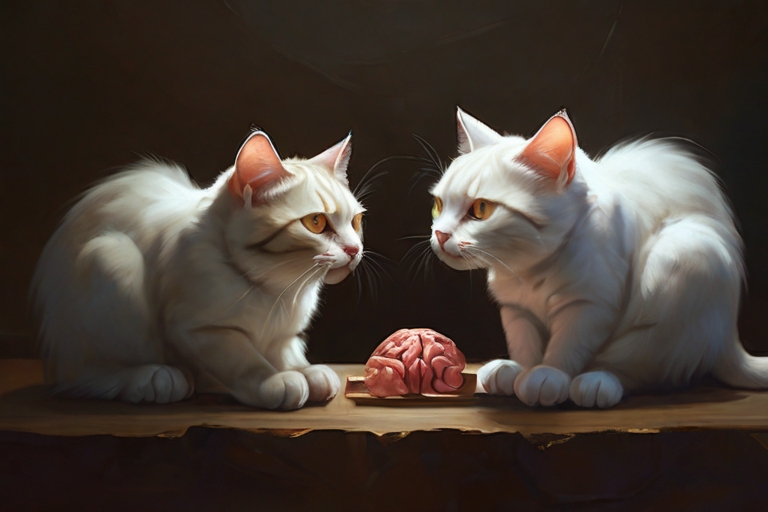A New Study Sheds Light on Connection Between Cats and Schizophrenia

Cat ownership has long been cherished for the companionship and comfort these feline friends provide. However, a recent study sheds light on a startling correlation between owning cats in early adulthood and the heightened risk of developing schizophrenia later in life.
A study confirms the link between cats and Schizophrenia

Cats have long been a source of fascination and mystery, but could there be a deeper connection between these enigmatic creatures and a complex mental disorder like schizophrenia? Recent research has shed new light on this intriguing link, revealing surprising insights into the relationship between cats and schizophrenia.
Understanding Schizophrenia
Schizophrenia is a serious mental disorder characterized by a range of symptoms, including hallucinations, delusions, and disorganized thinking. It affects millions of people worldwide and can have a profound impact on individuals and their families.
The Cat Connection: Historical Context
Throughout history, cats have been both revered and feared. Ancient civilizations often associated cats with supernatural powers and mysticism, while later cultures depicted them as symbols of luck or omens of misfortune.
Early Studies and Speculations
The idea that cats might play a role in schizophrenia is not a new one. Early researchers noted an unusually high prevalence of cat ownership among individuals with schizophrenia, sparking speculation about a potential connection.
Modern Research
In recent years, scientists have turned their attention to unraveling the mysteries of the cat-schizophrenia link. Rigorous studies employing advanced methodologies have yielded compelling evidence pointing to a surprising culprit: Toxoplasma gondii.
Toxoplasma gondii: The Culprit?
Toxoplasma gondii is a common parasite that can infect humans and other warm-blooded animals. Research has shown that individuals with schizophrenia are more likely to have been exposed to T. gondii, suggesting a possible link between the parasite and the disorder.
Biological Mechanisms
Scientists are still working to understand how T. gondii might influence the development of schizophrenia. It is believed that the parasite may alter neurotransmitter levels in the brain or trigger inflammatory responses that contribute to the onset of symptoms.
Psychological Factors
Beyond the biological mechanisms, owning a cat may also have psychological effects on individuals. The companionship and sense of purpose provided by pet ownership can have positive impacts on mental health, but for some individuals with schizophrenia, the responsibility of caring for a pet may exacerbate symptoms.
Debunking Myths
Despite the growing body of evidence, there are still many misconceptions surrounding the cat-schizophrenia link. It's important to separate fact from fiction and address common misunderstandings about the relationship between cats and mental illness.
Risk Factors and Prevention
Identifying individuals at risk for schizophrenia and implementing preventive measures is crucial. Education about the potential risks associated with cat ownership, as well as proper hygiene practices to reduce the risk of T. gondii infection, can help mitigate the likelihood of developing the disorder.
Ethical Considerations
The ethical implications of researching the link between cats and schizophrenia are complex. While scientific inquiry is essential for advancing our understanding of mental illness, researchers must also consider the welfare of animals involved in studies and ensure that their work is conducted ethically and responsibly.
Public Perception and Stigma
public perception of schizophrenia and its association with cats can perpetuate stigma and discrimination. It's important to challenge stereotypes and promote understanding and empathy for individuals living with mental illness.
Practical Implications
For individuals living with schizophrenia who own cats, it's important to prioritize self-care and seek support when needed. Healthcare professionals can play a vital role in providing guidance and resources to help manage symptoms and improve overall well-being.
Future Directions
As research into the link between cats and schizophrenia continues, there are bound to be new discoveries and insights that deepen our understanding of this complex relationship. By exploring new avenues of inquiry and embracing interdisciplinary approaches, we can hope to unlock the secrets behind this intriguing phenomenon.
Conclusion
The link between cats and schizophrenia may still be shrouded in mystery, but recent research has brought us closer to understanding the complex interplay between biological, psychological, and environmental factors that contribute to the development of this disorder. By continuing to explore this fascinating topic, we can pave the way for improved prevention, treatment, and support for individuals affected by schizophrenia.
FAQs
-
Are all individuals with schizophrenia cat owners?
- No, not all individuals with schizophrenia own cats. While there may be a higher prevalence of cat ownership among individuals with schizophrenia, many factors contribute to the development of the disorder.
-
Can owning a cat cause schizophrenia?
- There is no evidence to suggest that owning a cat directly causes schizophrenia. However, certain risk factors, including exposure to Toxoplasma gondii, may increase the likelihood of developing the disorder in susceptible individuals.
-
Is Toxoplasma gondii dangerous for everyone?
- While Toxoplasma gondii infection is usually asymptomatic in healthy individuals, it can pose serious risks to pregnant women and individuals with weakened immune systems. Proper hygiene and preventive measures are essential for reducing the risk of infection.
-
Should individuals with schizophrenia avoid owning cats?
- It depends on the individual and their specific circumstances. While pet ownership can have numerous benefits for mental health, individuals with schizophrenia should carefully consider whether they have the resources and support necessary to care for a pet.
-
What can I do to support someone with schizophrenia who owns a cat?
- Offer practical assistance with pet care tasks, such as feeding and grooming, and provide emotional support and understanding. Encourage open communication and connect them with relevant resources and support services as needed.

You must be logged in to post a comment.